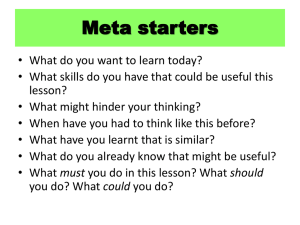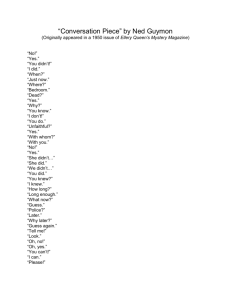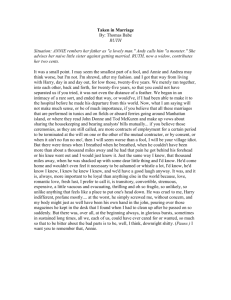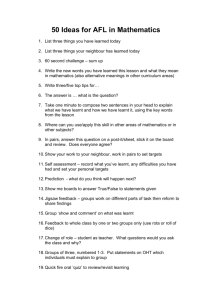As a young scholar whose career had barely begun, I first found
advertisement
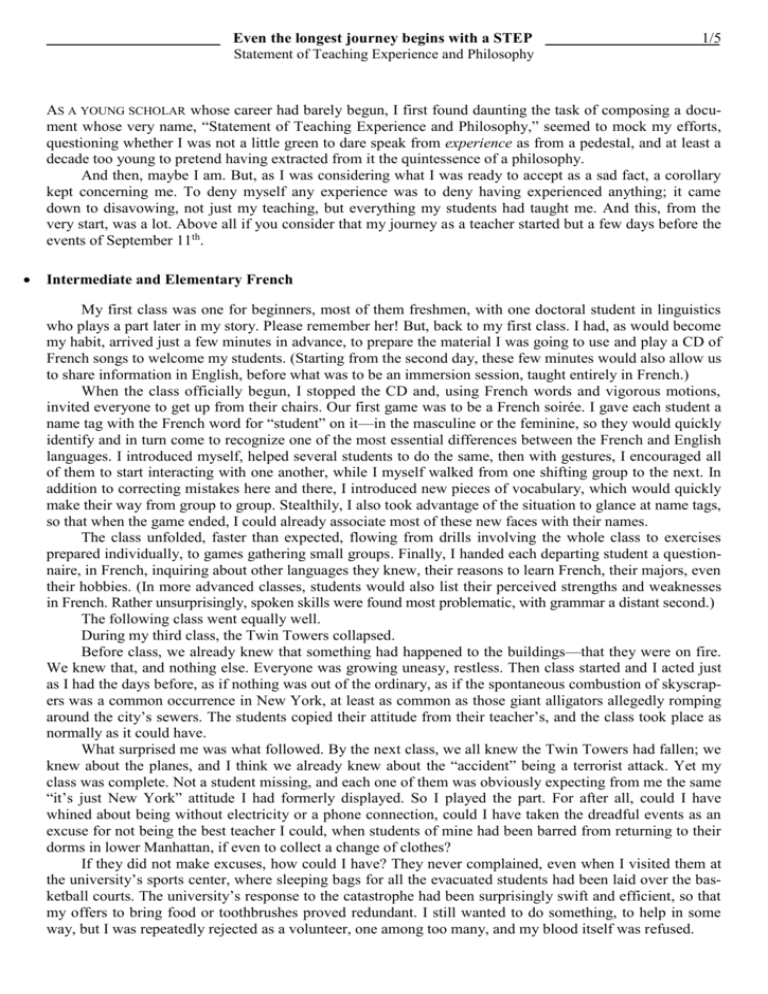
Even the longest journey begins with a STEP Statement of Teaching Experience and Philosophy 1/5 AS A YOUNG SCHOLAR whose career had barely begun, I first found daunting the task of composing a document whose very name, “Statement of Teaching Experience and Philosophy,” seemed to mock my efforts, questioning whether I was not a little green to dare speak from experience as from a pedestal, and at least a decade too young to pretend having extracted from it the quintessence of a philosophy. And then, maybe I am. But, as I was considering what I was ready to accept as a sad fact, a corollary kept concerning me. To deny myself any experience was to deny having experienced anything; it came down to disavowing, not just my teaching, but everything my students had taught me. And this, from the very start, was a lot. Above all if you consider that my journey as a teacher started but a few days before the events of September 11th. Intermediate and Elementary French My first class was one for beginners, most of them freshmen, with one doctoral student in linguistics who plays a part later in my story. Please remember her! But, back to my first class. I had, as would become my habit, arrived just a few minutes in advance, to prepare the material I was going to use and play a CD of French songs to welcome my students. (Starting from the second day, these few minutes would also allow us to share information in English, before what was to be an immersion session, taught entirely in French.) When the class officially begun, I stopped the CD and, using French words and vigorous motions, invited everyone to get up from their chairs. Our first game was to be a French soirée. I gave each student a name tag with the French word for “student” on it—in the masculine or the feminine, so they would quickly identify and in turn come to recognize one of the most essential differences between the French and English languages. I introduced myself, helped several students to do the same, then with gestures, I encouraged all of them to start interacting with one another, while I myself walked from one shifting group to the next. In addition to correcting mistakes here and there, I introduced new pieces of vocabulary, which would quickly make their way from group to group. Stealthily, I also took advantage of the situation to glance at name tags, so that when the game ended, I could already associate most of these new faces with their names. The class unfolded, faster than expected, flowing from drills involving the whole class to exercises prepared individually, to games gathering small groups. Finally, I handed each departing student a questionnaire, in French, inquiring about other languages they knew, their reasons to learn French, their majors, even their hobbies. (In more advanced classes, students would also list their perceived strengths and weaknesses in French. Rather unsurprisingly, spoken skills were found most problematic, with grammar a distant second.) The following class went equally well. During my third class, the Twin Towers collapsed. Before class, we already knew that something had happened to the buildings—that they were on fire. We knew that, and nothing else. Everyone was growing uneasy, restless. Then class started and I acted just as I had the days before, as if nothing was out of the ordinary, as if the spontaneous combustion of skyscrapers was a common occurrence in New York, at least as common as those giant alligators allegedly romping around the city’s sewers. The students copied their attitude from their teacher’s, and the class took place as normally as it could have. What surprised me was what followed. By the next class, we all knew the Twin Towers had fallen; we knew about the planes, and I think we already knew about the “accident” being a terrorist attack. Yet my class was complete. Not a student missing, and each one of them was obviously expecting from me the same “it’s just New York” attitude I had formerly displayed. So I played the part. For after all, could I have whined about being without electricity or a phone connection, could I have taken the dreadful events as an excuse for not being the best teacher I could, when students of mine had been barred from returning to their dorms in lower Manhattan, if even to collect a change of clothes? If they did not make excuses, how could I have? They never complained, even when I visited them at the university’s sports center, where sleeping bags for all the evacuated students had been laid over the basketball courts. The university’s response to the catastrophe had been surprisingly swift and efficient, so that my offers to bring food or toothbrushes proved redundant. I still wanted to do something, to help in some way, but I was repeatedly rejected as a volunteer, one among too many, and my blood itself was refused. Pierre-A. Sicart 2/5 At that point, I stopped trying to help in ways that were not me. But then, what was I? A teacher, I reflected, and a writer. The writer helped as he could: my short story on September 11th spoke of hope to the 100,000 readers of News Bourse, while most of the four hundred dollars I received went to the New York office of Tzu-Chi, a relief organization I knew and trusted. But what could the teacher do that he was not already doing: teaching? Once again, the answer came from the students. One of them, notably, brought a video of the stand-up comic Eddie Izzard playing a tourist in France, with many of the words we were learning in class. Everyone laughed and, if but for a few minutes, forgot about their predicament and the looming menace. I was delighted. Not only by the video and its positive effect on everyone’s mood, but by the student going out of her way to bring it. I understood that, like her, I could do more to help the class. I also understood three important lessons. The first is that students learn best when they forget they learn; the second is that students learn best when there is some form of emotional investment; the third, which contains the first two, is that the French learnt in class is not learnt for the classroom. These are basic concepts, obviously, yet easier to remember than to apply. Let us consider the audiovisual material I had been using. The French songs I played before class, to begin with. They were undeniably useful in setting the right mood, but not yet as study material. The video tapes which came with the textbook, on the other hand, were perfect as study material… but for the fact that they were considered as such, and only as such, by the students. The Eddie Izzard video, on the other hand, had offered them an opportunity to use what little French they had learnt to better enjoy a “real” video—as in, to use their French in “real” life. From that point on, I started exploiting more “real life” material. My students were surprised when they discovered that, by making it a class effort, by pooling their knowledge and educated guesses, they could actually translate the lyrics of a pop song currently enjoyed in France. For the first time, it dawned on them that they were no longer complete beginners. They were also surprised to each receive a postcard from France, which inquired about their studies and the hobbies they had mentioned in the questionnaire distributed a few weeks sooner. They had just been given more homework, yet they saw it as a treat. Along the years, I kept trying new ideas. To another class, I brought varied traditional French candies, whose histories and regions of origin we proceeded to explore as part of the “cultural discussions” requirement. For my last class, I chose to replace most of the cultural questions in the textbook by two-student presentations on free French-related topics. Once again, it was giving them more work, yet they all seized the opportunity to share with everyone some of what made French culture special to them. These presentations were always followed by lively discussions. Subjects included fashion, soccer players, or even pastries, as one of the students decided to cook crêpes for everyone. I had made it clear that it was not an exam, that final grades could not suffer from it, and it was treated more as a game to be played seriously than as a chore to endure. And those presentations offered yet other advantages. For one, unlike the textbook cultural questions, I knew they would not be quickly forgotten. Also, they gave me an opportunity to assess individual interests and focus on developmental needs, having paired up the same students who had already decided to take the final oral exam in these pairs. Feeling more prepared, more at ease with their partners, they would make less stress-induced blunders, thus reducing the gap between performance and actual competence. It is the same concern which had led me to administer a blank written exam before the first real one: a blank exam, but led, corrected and graded like the real one would, so that my students would know what to expect. Designed to judge a student’s success, those exams helped me estimate mine as a teacher. The grades in themselves were a poor indicator, but if several students made the same mistake, then it was a point worth teaching again, using a different approach. If, on the other hand, the same mistake was made repeatedly by one student, I advised them to come see me during my office hours, when I would proceed similarly, by exploring new ways to teach the same point. While I heard, mainly as the official tutor for the Department of French, many a student swear that they would never be able to grasp such or such grammatical rule, or to differentiate between such and such French syllable, I have yet to meet one who did not discover that they finally could. They were just receptive to a different learning approach. As for me, the lesson I learnt then was simply: there is always a way. Which also means: I can always become a better teacher. In this quest, I especially valued direct feedback from the students, but while I created a discussion list for each of my classes and did receive some feedback by email, I heard mainly from the more satisfied elements. The less satisfied ones would only Pierre-A. Sicart 3/5 express themselves in the final teacher’s evaluation, where their comments could only benefit the next class I would teach. In retrospect, I wish I had created an email account that any of my students could have accessed, as a means to communicate with me anonymously throughout the semester; it is an idea I will apply in the future. Incidentally, I have sometimes received positive feedback months or even years after the class had ended. Twice, I received emails from ex-students regarding a song I had played for them which they had heard again or wanted to find. Five times, I received requests for letters of recommendation. To quote one of the emails: “I am asking you to write on my behalf, because I feel that during the time that I was in your class, we got to know each other fairly well. Frankly, you are the only one of my instructors at NYU who knew me very well at all.” I felt flattered, and a little ashamed that I could not remember her better, but I keep files on each of my students, including all the emails they have ever sent me, and it proved easy to write what she needed. Of course, requests for letters of recommendation are not a rarity. But what this student told me, finally, is that I had made her feel special. In retrospect, I realize several other students have expressed the same feeling, and I believe it is part of what made my teaching successful. I had encouraged them to come to class with their own personalities and interests, and conversely, it drove them to make French a part of their lives as individuals, not just as students. As I mentioned, I try to always keep in mind that what is learnt in class is not learnt for the classroom. Learning French is not the objective; using French is. For that reason, while I am happy when I can give an “A,” I am even happier when a freshman borrows from what little vocabulary we have learnt to joke in French and make the whole class laugh, or when a more advanced student composes poems in French, or when another shares with me her thoughts on Baudelaire, or when I receive emails from ex-students about their trips to France. By considering what I wanted my students, not to know, but be able to do, I believe I naturally encouraged such initiatives. Simply by treating each student as a distinctive individual, I made it easier for them to use French in their lives. Happily, it is also because each student is a distinctive individual that I never felt I was teaching the same class twice, even when teaching the same level. Each day offered different challenges, different opportunities to develop. There is always more to discover and, not just for the student but also for the teacher, always room to grow. French Language and Literature In my two years as a Teaching Assistant for New York University, I was nominated twice for universitywide teaching awards. Yet, if memory is kept of my passage, it will certainly be for my work as the Department of French’s “resource person.” Over three semesters, I transformed what was very much a sinecure into a position busy enough that, when I left, two other Teaching Assistants had to replace me. The first reason is that I did not let students come to me. I wooed them. Apparently, I was the first tutor in years to ask the students about their availability; accordingly, most of my office hours ended taking place late in the evening. As a second step, I distributed attractive flyers to all the Teaching Assistants and instructors, to pass over to all their students. More than just to inform, these flyers were designed to fight the fear of the tutor, too often seen as the last recourse for “students with a problem.” After my first semester, I was also able to put forward that, problem or not, most students who had come see me had ended with top final grades, and several with book awards—an honor bestowed upon the best student in any one class. My campaign bore fruit, and while my predecessors had been able to spend hours working on their own papers undisturbed, I found myself tutoring up to eight students simultaneously, ranging from complete beginners to students in literature. Playing on my strengths, the very same I had developed as a teacher, I was constantly designing more of my own practice drills, exercises and learning games, to satisfy the specific needs of each student visiting me. As if it were not enough, I had also started welcoming students working on their papers, which I reviewed and commented with the consent—and, soon, the support—of their professors. Incidentally, I thus became the Department of French’s first resource person for graduate students, whom I ended assisting not only with their papers but with the MA and PhD orals, helping some to prepare their lists and others to practice answering questions. I also helped both graduates and undergraduates with personal projects, such as studying/teaching in France or joint PhDs with French universities. Pierre-A. Sicart 4/5 Teaching and Technology In addition to being the first resource person for graduate students, I was also the first to hold some of his office hours in a computer lab. There, not only did I introduce students to didactic software and online resources, I was also able to demonstrate how they could take advantage of programs as common as Word specifically to better their French. Later on, answering a request from Professor Kimberlee Campbell, Director of French Language Programs, I would take advantage of the same laboratory to assist in the training of instructors and fellow Teaching Assistants in the use of computers as pedagogical tools. I have already expressed my belief in teaching as a sharing process which expands beyond the classroom walls. Naturally, the application I made of computers to academic matters expanded well beyond the doors of the computer lab. I already mentioned the information list I set, as a teacher, for each of my classes. As resource person, I expanded on the idea and started NYC in French, the first list devoted to the department’s entire undergraduate student body, which allowed to share information on “everything French” at and around New York University. I should stress that this mailing list did not allow me simply to spread information, but indeed to share it; it notably made it easier to request feedback, not only from my own students but from fellow Teaching Assistants, instructors, and their students. This feedback led to the creation of a website—over the summer, on my free time—with an ordered selection of links (mostly devoted to French culture) and my own audio recordings of French vocabulary. These recordings were made available in the form of downloadable audio files in the popular mp3 format: more than a hundred files, more than one hour total, covering four semesters of French vocabulary. The website was soon used by students, Teaching Assistants and instructors alike. Now, you have certainly forgotten the doctoral student in linguistics I mentioned on page one. She, on the other hand, had not forgotten me; she had come to visit me several times since I had started tutoring for the Department of French. The last time I saw her was in the computer lab, where she asked me to help her with one of her projects. She proceeded to record my voice as I read through a stack of pages covered with French words or simply combinations of French vowels and consonants. It reminded me of the most successful phonetic exercise I had designed to help students differentiate between French syllables which, to most native English speakers, sound initially the same. I have already mentioned that most students of French feel that their weakness lies in their spoken skills, or to be more precise, in both their aural and oral skills. An often accurate estimation, according to my experience as resource person. Therefore, as I was helping my ex-student with her project, I began to consider the possibility of programming a multimedia version of my own phonetic exercise, to help students progress in the absence of a teacher. The concept evolved into an addictive phonetic game, which you can try on my website: www.sicart.info This game became part of French Out Loud, a joint project with Professor Kimberlee Campbell, for which we were awarded a grant by the Technology and Teaching Mentoring Program at New York University. Before I became a doctoral student, I was trained as a computer expert; I worked on projects for Microsoft, as well as on several computer books as an author, editor, and translator. Building upon this expertise, I have brought technology to better serve teachers and students, with the understanding that languages allow people to communicate. Computers are but tools, if very complex ones. When it comes to languages, it is still my belief that the best software will never rival a good teacher. Am I a good teacher? At the very least, I believe I have constantly improved. I am still eager to. I am also eager to expand my teaching horizons. While, as the Department of French’s resource person, I have regularly tutored literature students on a one-on-one basis, I still yearn to share my love of literature by teaching my own classes, especially in some of my areas of expertise. In France, I was formed mainly as a specialist of the 19th century, shifting to the 20th century after the DEA (the French equivalent to the MPhil). Since my freshman year, I have also registered for every possible theater-related class . . . even in the Department of English, where I wrote a paper and passed my final exam on Shakespeare’s Richard II. In addition, I have some experience as a writer of fiction, and of course, my doctoral dissertation has driven me to study not only autobiographical texts, but also the links between the social sciences (mainly psychoanalysis) and modern literature. Most syllabi I have developed revolve around these centers of interest and present Pierre-A. Sicart 5/5 “classic” literature courses (from “Le Romantisme” to “Writing the Self: a Postmodernist Point of View”). Two courses, less common, are outlined below. The first aims principally at perfecting the students’ spoken skills; the second, their written skills. Act French I took to acting in primary school, before I even came to writing but for a same reason: because of the need I still feel to bring stories to life. If I began studying literature because of my passion for reading and writing, I also carried over my love for theater: I took many courses revolving around acting or specific plays and playwrights, and nearly as soon as sent, my article on Jean Anouilh was accepted by the most prestigious scholarly review on French theater: la Revue d’Histoire du Théâtre. I have since been working on other articles on French theater (one on Corneille; another on Beaumarchais). This course, Act French, is similar to workshops I have enjoyed in France. It consists in staging a play—or scenes from different plays—selected among the French classics by the students and their professor. Under my supervision and with my help, students stage the play and share the roles (in a one play, a same part is usually filled by different students under a same costume, so more students can participate and not any has to learn the whole play by heart). The final exam takes the form of a performance open to the university at large, the logistics being my responsibility. Fusing French as a language with drama as an art form, this interdisciplinary course is ideal for undergraduates who have completed the language curriculum. Many students of that level, especially Freshmen who have learnt the language in High School, master written French much better than spoken French; this course allows them to challenge and refine their oral skills. Borrowing from French masterpieces, they rediscover the verbal beauty of the language. While improving their diction, they come to learn about a play, a playwright, an era, as well as about a form of writing, in a dynamic fashion. This experience will deepen their appreciation of plays in general and French plays in particular, adding another layer of understanding to future textual analyses. Creative French The only such course offered for credit in the United States was taught once at New York University, by Serge Doubrovsky. In France, there is no such thing as a course in creative writing. The French academic system trains professors, not authors, and there is an understanding that writing is a gift that cannot be taught. While it is true, to some extent, that inspiration cannot be taught, any more than a love for literature, inspiration is not everything. Just as a language can be taught; just as it is possible to help students improve on their critical writings; just as it is possible to communicate a knowledge that deepens the appreciation one has of literary works, it is possible to pass on tools useful to personal writing. This course functions as a workshop: students are required to produce narratives, as well as to comment on each other’s. Pieces from recent anthologies serve as examples of what is published today. The final paper takes the shape of a short story on a topic chosen by each student from those I make available. These topics are from actual open calls from editors, to whom the stories shall be sent (the selection process being often lengthy, the fate of each tale has no effect on its author’s final grade). After having published my first stories, I began receiving far more such open calls than I can answer. Pieces chosen for publication are remunerated, with contract. Another aspect of the course consists in an initiation to the publishing world, from the eye of the author: how to format one’s texts, how to protect them, how to submit them, where to send them and what (often unwritten) rules should be respected. This course provides the student with a different point of view on the literary text, in its living state, and on the professional world around it. As with Act French, this experience will add another layer of understanding to future textual analyses. On a more basic level, this course aims at the improvement of the student’s writing, to make it more efficient—a necessity not only when crafting stories but also when composing papers and scholarly articles, all of them texts which need to seduce professors, editors and readers.

